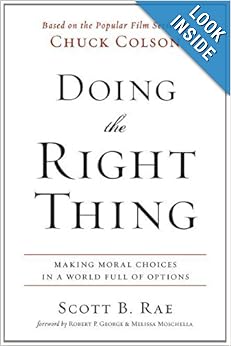Doing the Right Thing by Scott B. Rae
http://www.amazon.com/Doing-Right-Thing-Choices-Options/dp/0310513995/ref=tmm_pap_title_0

Doing the Right Thing: Making Moral Choices in a World Full of Options by Scott B. Rae
http://www.amazon.com/Doing-Right-Thing-Choices-Options/dp/0310513995/ref=tmm_pap_title_0

Doing the Right Thing: Making Moral Choices in a World Full of Options by Scott B. Rae
Based upon the film series by Chuch Colson, Doing the Right Thing by Professor of
Christian Ethics Scott B. Rae of Biola University, is a rush of fresh air
through the issues of medicine, marketplace, and public life. The book is short and succinct but chalk full
of insightful wisdom on the major issues that we face today. Rather than virulently stay away from the tough
questions that cultural critics ask about Christianity, Scott answers these
objections head on with honesty and transparency. Lifting up the truth of God’s Word, sound
logical principles, and a desire to see human flourishing as part of the goal
of life, Scott is well equipped to give us very good answers to our questions,
from outside and within the walls of the church.
In the first chapter Scott draws out the ethical mess we
find ourselves in by relating the simultaneous views of considering some things
are absolutely wrong while wanting to hold that morality is relative. Murder, incest, rape are absolutely wrong but
don’t mention abortion or gay rights, these are off the table in the realm of
right and wrong. Feelings and opinions
are the moral arbiter of truth rather than some fixed standard of morals.
(25-26) In contrast to the prevailing
notion that morals are incidental and only personal feelings of the individual,
Scott puts forth a view that for a Christian worldview ethics are both
universal and knowable (34-35). At all
times and in all places, Christian ethics are right independent of cultural
norms, values, and tastes. Furthermore,
Christian ethics are knowable by virtue of God’s Word and being his image
bearers. God has revealed his will for
ethical, moral, and personal living, not just one area of life. Even through the fall of man has bent
humanity in the direction of sin and evil, man retains the vestiges of the
image of God in his understanding of justice, rationality, and right and
wrong. By creation and revelation, God
has not left man in a state of confusion regarding his vision for ethical
living.
Scott asks great questions in this book. One of those questions is, “Can objective
morality be adequately grounded apart from God existing?” (57) I applaud Scott’s sincere honesty in saying
that people can live a moral life without respect for God. Yet, this begs the question about objective
morality. Without reference to a Divine
lawgiver, how do we speak objectively about morality, right and wrong? Scott is right to propose that in a
naturalistic worldview, objective morality is impossible to debate because
there is no foundational binding position on issues, just preferences and
opinions. I would also add here that the
question can be reframed in terms of trust; without reference to God as
providing moral objective foundations, whose voice are we going to trust when
looking to make ethical decisions and why?
In some parts of the world, morality is guided by the loudest or most
violent voice through coercion and manipulation. But, for the Christian believer, ethics are
founded upon the objective Word of God, his revelation of himself, and the
image of God that we have been created with.
I find myself applauding Scott’s work here in the numerous
examples he provides. In one case, he
makes the point that, “what constitutes a human person is not fundamentally a
scientific question but a philosophical one.” (104) Science can tell us what constitutes a human
being by discussing how the body works, but it cannot tell us fundamentally
what a person is morally. The scientist
in the debate with Scott conceded this point to Scott’s credit, yet he also
maintained that if science can’t answer it, then it’s all an opinion of an
individual. The scientist is trapped in
his own worldview that outside of scientific explanations no solid answer is to
be found.
I really enjoyed this book.
With plenty of real life examples and solid logic, Scott gets us to
think how a Christian ethical viewpoint radically shapes how we view the world,
and in turn how we act in the world.
Thanks to Zondervan and Book Look Bloggers for the copy of this book in exchange
for an honest review.
Comments
Post a Comment